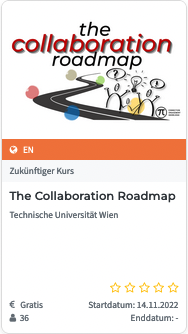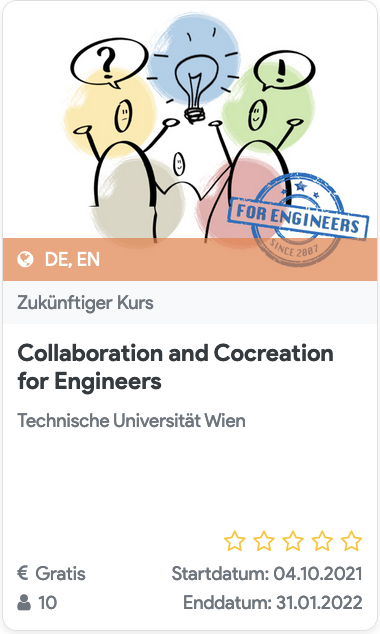Seit gestern ist auf iMooX.at der MOOC „Collaboration and Cocreation for Engineers“ freigeschalten und aktiv. Allein die Beschreibung klingt schon unglaublich spannend:
Kooperation und Co-Creation sind für alle Arten von Organisationen eine Notwendigkeit geworden. Als Ingenieur arbeitet man nie allein. Die Fähigkeit, verschiedene Parteien zusammenzubringen, um gemeinsam ein für beide Seiten wertvolles Ergebnis zu erzielen, kann nicht theoretisch erlernt werden. Dieser Kurs gibt den Teilnehmern die Möglichkeit, ihre Ideen auf die Werkbank zu legen und sie gemeinsam zu entwickeln.
Bitte beachten Sie, dass dies kein „normaler“ Kurs ist, bei dem Sie Informationen konsumieren und herunterladen. In diesem Kurs wendest Du deine Teamfähigkeit in selbstorganisierter Weise an. Der Kurs ist ein Erlebnis. Es gibt kein Buch, aus dem man dies lernen kann. Die Erfahrung ist für jede Person anders und einzigartig, wobei das Geben von Feedback an andere und das Reflektieren über die eigene Arbeitsweise Teil Deiner täglichen Arbeitsschritte werden.
Deine Idee ist zu groß, um sie allein zu verwirklichen? Ja, natürlich ist sie das. Dieser Kurs ist deine Chance, deiner Idee ein Fundament zu geben, das dich inspiriert, aktiv zu werden und sie zu verwirklichen.
Jutta hat es sich zur Aufgabe gemacht, Ideen zu unterstützen, geboren zu werden, damit sie eine Chance haben, es über deine Gedanken hinaus in die Welt zu schaffen. Es geht darum, unsere Ideen ernst zu nehmen und sie im Team mit anderen Wirklichkeit werden zu lassen. Diese Herausforderung alleine zu lösen, ist nicht nur aufgrund der Komplexität einfach unmöglich, sondern macht einfach keinen Spaß.
Wie immer ist die Teilnahme kostenlos: [Link zur Anmeldeseite]



